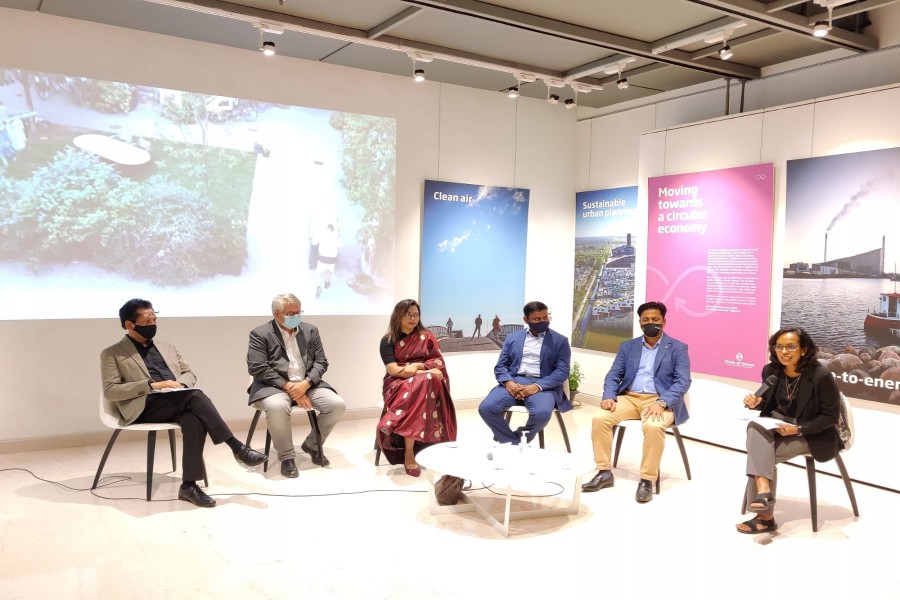Over the past four decades, Denmark has managed to grow its economy while lowering CO2 emissions and resource consumption – proving that it is possible to have a green economy that also creates more jobs.
Denmark’s ambitious goals to reduce carbon footprint and achieve sustainable growth is globally relevant, especially in a fast-growing economy like Bangladesh.
Hence, the Embassy of Denmark in Bangladesh hosted a five-day exhibition at Bay’s Edge Gallery, in the backdrop of COP26 taking place in Glasgow, to highlight commercially viable green solutions that can support sustainable and inclusive economic growth in Bangladesh.
The Danish Ambassador, H.E. Ms Winnie Estrup Petersen, emphasised that ‘‘The ‘Green Together’ exhibition embodies and shares with a Bangladeshi audience Denmark’s understanding of sustainability, which is a holistic approach to the environment and lifestyle, and also includes social goals like responsible business, good governance, equality, and inclusion.’’
As a frontrunner in green economic growth and a leader in clean technologies, Denmark is well-positioned to serve as a knowledge partner for Bangladesh on its journey towards a greener and more sustainable society. As such, the exhibition also included four-panel discussions that highlighted key challenges on this journey and opportunities for the Bangladeshi public and private sector.
‘Sustainable Green Buildings and Future of Urbanization’ was the focus of the exhibition’s panel on the opening night.
While we do not think of buildings and installations as sustainable, they have a significant impact on the environment. Indeed, living and workspaces can be designed to be more resource-efficient while offering modern aesthetics and comfort.
The panel members highlighted possibilities for sustainable residential, commercial, and industrial spaces in Bangladesh building on the progress achieved thus far.
Attendees from government bodies, top real estate developers and architects, and Danish companies engaged in discussions on how simple technologies, such as energy-efficient water pumps and ventilation systems, can be integrated into buildings for more sustainable urbanisation.
On the second day of the exhibition, the panellists unpacked the ‘Future of Sustainable Apparel Production.’
With the apparel sector as the biggest contributor to the Bangladeshi economy and Bangladesh most impacted by climate change, the key question was how can the apparel sector remain competitive while responding to the demands of the climate crisis.
Guests ranging from industrial process experts and international brands from Denmark to leading Bangladeshi RMG manufacturers shared recommendations on how Bangladesh can better position itself as a sustainable manufacturing hub and a producer for high-value goods. Ultimately, becoming greener will make the Bangladeshi apparels sector even more competitive in the international arena.
Panellists on day three of the exhibition spoke on the ‘Sustainable Future of Food’. Bangladesh recently hit the 1 billion mark from the exports of agriproducts.
Although a dominant export sector in Bangladesh, agriculture and food production struggles with several challenges around food loss, food safety, and quality throughout the agrarian value chain. Bangladeshi food safety regulators, industry leaders from the agro-food processing sector and innovative start-ups together with Danish sector representatives conferred on how to increase access to healthier foods, reduce food loss and increase food quality for export.
Denmark’s expertise on sustainability in food production can help improve productivity and build an efficient food and agro sector.
Lastly, the Embassy hosted a discussion on day four of the exhibition to highlight the importance of ‘Transition to Sustainable Infrastructure.’ Sustainable and green infrastructure development, from digital and physical connectivity to energy and services, is key for a climate-vulnerable country like Bangladesh to improve productivity, economic growth, and quality of life.
Danish examples of inclusive and sustainable infrastructure were shared with exhibition attendees, who represented local investment agencies, banks and financial institutions, Danish and Bangladeshi infrastructure developers, and the chief guest Honourable ICT Minister Zunaid Ahmed Palak. The panellists and guests deliberated on the need for more investment in this sector to help facilitate Bangladesh’s green transition.
Public and private sector initiatives are key to delivering an efficient response to the climate crisis. Denmark hosts this exhibition to raise awareness and share experiences for new ways forward. In collaborating with Bangladeshi partners, Denmark believes it can accelerate climate action to help us all pass on a prosperous and sustainable world to the coming generations.


